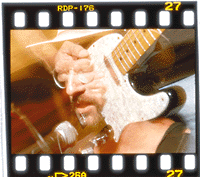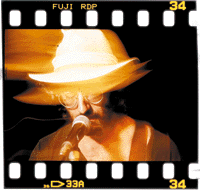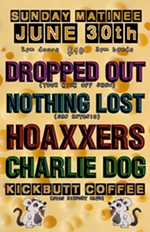On the Verge of Obsolescence
James McMurtry
By Michael Bertin, Fri., June 20, 1997
|
|
After a quick reassessment of the situation, the 35 year old singer-songwriter recants his initial reaction to this scenario-in-waiting: "It probably won't upset me, because [Where'd You Hide the Body] didn't sell five records to anybody's grandmother, so they're not ever going to hear my version."
McMurtry had a five-album deal with Columbia, but made just three for the label. Columbia held the option after each album, and as a result of what McMurtry calls a "dismal" showing for Where'd You Hide the Body, the suits decided not to keep him around for a fourth. Talking about it now, there's some bitterness in his voice, camouflaged by concessions to the pedestrian realities. "I can't complain that much about Columbia, because my story there is the same as hundreds -- thousands -- of other people on majors," says McMurtry. "Generally, if you don't happen to break on that first record -- were talking post-1980 -- well, you're lucky if you get two."
McMurtry ended up on North Carolina-based indie Sugar Hill (which, oddly enough, is Keen's old label) for his latest, It Had to Happen. Produced by Lloyd Maines and recorded locally at Cedar Creek studios, the album came together quickly, but not necessarily easily. With just three days to track everything, McMurtry & Co. first had to battle an Austin winter. A mid-January storm turned the oxymoron into an actual problem, but a set of tire chains he picked up in Seattle a couple of years back saved McMurtry from sacrificing one session to the ice that paralyzed the town for a couple of days.
Then there were bizarre technical problems. McMurtry's solid state amps just didn't jive well with Cedar Creek and kept turning into radios, picking up "bad country music, loud and clear." He'd spend hours flipping the things upside down so that the cables would be flat on the floor and not acting like antennae.
These unforeseen obstacles, while annoying, were not without fortuitous consequences. "It was just something that'd drive us batty, but I think that may have actually contributed to the record, because there were a couple of things where we got really good takes that we wouldn't have got if we hadn't been absolutely exhausted," notes McMurtry. "`No More Buffalo,' for one, is a whole lot slower than I would have thought to play it. But it was the last song of the day and we were all winded, so it came out a lot lazier. It kinda surged with that ebb and flow kind of thing. We wouldn't have gotten that if we had all been alert enough to think about it. It was just all muscle memory."
|
|
was through his father's screenwriting collaboration with John Mellencamp, that the pop music icon "discovered" the author's son and "brought" him to Columbia for his debut, 1989's Too Long in the Wasteland.
That same year, McMurtry moved to Austin as his then fiancée/now wife was attending graduate school locally. A self-described "hybrid Texan," McMurtry was born in Fort Worth and did some of his growing up in Virginia among other places before returning to the Lone Star state. And like local legends before him -- Guy Clark, Jimmie Dale Gilmore -- he has one of those distinctive songwriting voices that the indigenous great are born with. McMurtry's songs find a uniformity in otherwise disparate peoples, capturing something universal, albeit often desolate, in the big picture experience that gets obfuscated by day-to-day-ism; as something of a preservationist, he has a penchant for documenting places in danger of disappearing from the map, people on the verge of extinction, and ways of living that are rapidly being outmoded. Right down to the beat up '66 Volvo he drives, McMurtry seems fascinated with things on the verge of obsolescence.
"Maybe that's what draws me to it," he surmises. "I don't like to lose things because I didn't bother to write them down. So, settings, ways of observing certain things, pieces of language, ways of talking that are fading -- I seem to have a compulsion to get those down before they go away.... It's just worth noting. If you don't note it, then it might as well never have been."
Thus, the small-town bent frequent to his writing seems natural. The turnover of language is slower, the routines get elevated from habit to law, the Dairy Queens still linger, and with no place to hide, nothing escapes detection. It's fertile ground for a would-be arteest. "I spent a lot of time riding around with my grandmother when I was a little kid and she lived in a small town," recounts McMurtry. "It was one of the places I got sent a lot. If both of my parents were doing something, I'd wind up with one of the grandparents.... So, I got to see a good bit of that small town. And off and on growing up, I lived in little towns. I don't think it's really that much different in the city. People are driven by the same things -- nosiness, greed, prejudice."
|
|
"There's always a bit, kind of woven in there," he says, "but it's better not to stick to it. For me, it gets boring if I stick too close to autobiography; you wanna let the song write itself, as much as you can. Some will change the whole storyline for the sake of a rhyme. I'm willing to let it change, but I think the worst thing you can do to a song is make a point ahead of time -- go at it with a notion of, `I want to say this.' You're going to write a sermon, you're not going to write a song."
For all the stories and all the lessons in his songs, they are amazingly free from directives or even suggestions. The story is there, and if you look, you can probably discern that something has gone horribly wrong in going from point A to point B. If you aren't looking then, well.... As McMurtry describes it, it's very laissez-faire: "`Here's the problem, if you don't see it, too bad.' You get into that, `Why can't you see it?' and you're another hippie on a soapbox trying to save the world. I don't think that's what songs are for."











